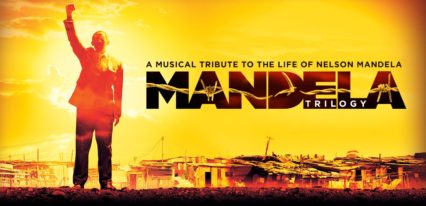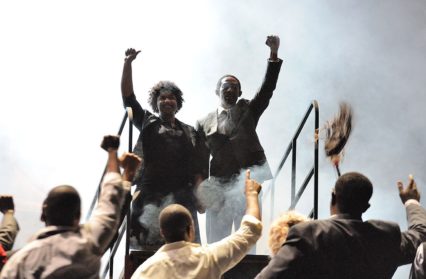Donald Gordon Theatre, Wales Millennium Centre, Cardiff, 27 August 2016
Music by Peter Louis van Djik and Mike Campbell
Written and directed by Michael Williams
Cape Town Opera
Cape Town Philharmonic Orchestra and 12 Ensemble
Conducted by Tim Murray
Nelson Mandela’s story from boyhood through imprisonment to becoming President of his country was filled with so much real-life drama that a stage work is hard-pushed to do justice to it. Mandela Trilogy, created for Cape Town Opera in 2010, had its European première at Cardiff’s Millennium Centre in 2012. Writer and instigator of the work Michael Williams wanted to contribute to a South African operatic repertoire for black singers, and invited two composers to collaborate in the creation of a three act opera covering different stages of Mandela’s life until his release after 27 years in prison. There are also three different singers who play Mandela at different stages in his life: growing up in the Transkei, where he is initiated into adult life in the Thembu tribe; politicisation in Johannesburg; and the long years of imprisonment. The character Nelson Mandela 3 also acts as a narrator throughout, and this helps to give the work dramatic coherence.
Michael Williams has made revisions for this 2016 UK and Ireland tour and writes in a programme note of the work being “now less grand opera and more musical theatre”. It certainly covers a lot of diverse musical ground, and no harm in that, but it lacks a distinctive voice and misses the opportunity to build on the musical traditions of South Africa to create this. Much of Peter Louis van Djik’s music of Act 1 is described as being based on traditional Xhosa songs, but sadly the spirit of African music failed to come across strongly, partly because of a balance problem with the chorus sound being overwhelmed by the orchestra which, while playing with brio, needed to keep the volume down.
 Given the difficulty of matching on stage the strength of personality of any iconic figure, an alternative way is through portrayal of some of those with whom they have important relationships. In Act 2 of Mandela Trilogy, Mike Campbell’s musical writing for the women in Nelson Mandela’s life is effective and presents some of the most poignant moments in this show. Zolina Ngejane gives a standout performance as Mandela’s lover Dolly, particularly when singing the 1950s protest song Meadowlands, its unaccompanied strains conveying powerfully the painful reality of what was happening back then to black people being evicted wholesale from their homes. Pumza Mxinwa as first wife Evelyn and Siphmandla Yakupa as wife-to-be Winnie are also strong, and the trio Hearts and Minds sung by the three of them is very affecting, pointing up the toll which political action can take on personal relationships as they sang “He said that winning hearts and minds was all that mattered”.
Given the difficulty of matching on stage the strength of personality of any iconic figure, an alternative way is through portrayal of some of those with whom they have important relationships. In Act 2 of Mandela Trilogy, Mike Campbell’s musical writing for the women in Nelson Mandela’s life is effective and presents some of the most poignant moments in this show. Zolina Ngejane gives a standout performance as Mandela’s lover Dolly, particularly when singing the 1950s protest song Meadowlands, its unaccompanied strains conveying powerfully the painful reality of what was happening back then to black people being evicted wholesale from their homes. Pumza Mxinwa as first wife Evelyn and Siphmandla Yakupa as wife-to-be Winnie are also strong, and the trio Hearts and Minds sung by the three of them is very affecting, pointing up the toll which political action can take on personal relationships as they sang “He said that winning hearts and minds was all that mattered”.
Act 3, with music composed as for Act 1 by Peter Louis van Djik, had strong moments for the chorus, first as the crowd reacting in the court room to Mandela’s sentence and then the male chorus in the prison on Robben Island singing Do You Remember Our Freedom? The dragging beat of the music conveys their sorrows and frustrations, not least in their despairing cry “Who are the young men that sleep with our wives?”
Of the other principal singers Mandisinde Mbuyazme, stepping into the role of Nelson Mandela 3 at short notice, gave a particularly solid performance. Thato Machona and Peace Nzirawa as Nelson Mandela 1 and 2 respectively conveyed the character of the man at different times in his life convincingly. Lukhanyo Moyake as Mandela’s cousin was notable in providing strong support.
There was a moment in Act 3 when the work recalled Leonard Bernstein’s Mass, not so much in musical terms but emotive force, as the imprisoned Mandela sang of the value of simple things. The company placard-waving and raised fists that accompanied singing about freedom both longed for and finally achieved carried less impact because it was, I felt, too generalised.
The Mandela Trilogy, while obviously heartfelt in its writing and composition, performed with verve and commitment by all concerned and appreciatively received by the matinee audience, somewhat missed the mark. This was partly because it attempted to do too much and partly because it forced African performers into a European performance mould where they were not completely comfortable. Only after the curtain call in their encore singing did the company convey a real sense of delight in singing which is evident in the music of their country outside the confines of the concert hall and the opera house.



 Enjoyed this article? Support our writers directly by buying them a coffee and clicking this link.
Enjoyed this article? Support our writers directly by buying them a coffee and clicking this link.







